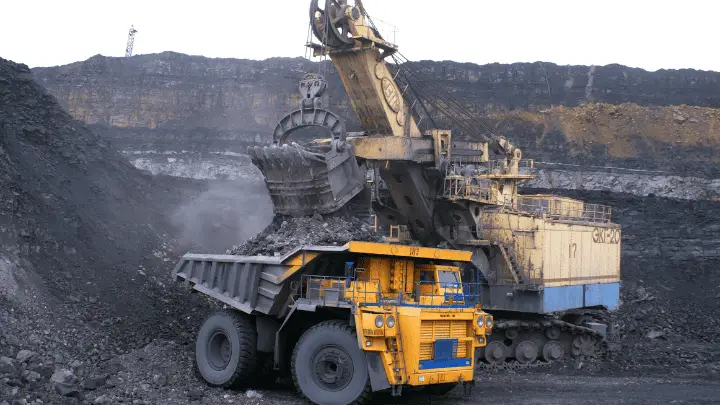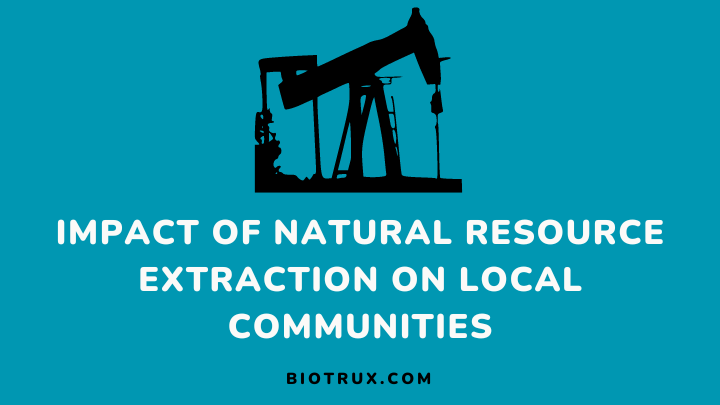The impact of natural resource extraction has long been a conundrum to modern society’s development and growth, even in local communities. Oil, minerals, and other natural resources have created vast opportunities and propelled economies worldwide at break-neck speeds.
However, the boom in extraction comes with a range of issues that impact the communities where resources are extracted. The fundamental impact is economic—improved trade and job creation, but that’s not all.
Environmental damage, cultural dislocation, and loss of biodiversity are real, and the impact on local communities can be devastating. This article explores these impacts and how they affect people who live and work in areas where resource extraction occurs.
What is Natural Resource Extraction?
Natural resource extraction is extracting natural resources from the earth for human use. These resources include minerals, oil, gas, timber, water, etc. This process can take many forms, from traditional mining and drilling to more modern methods such as fracking and mountaintop removal.
While natural resource extraction can provide significant economic benefits, it can also cause significant harm to local communities and the environment. As such, it is essential to understand the impacts of this practice on communities to mitigate its negative effects and ensure a sustainable future.
The following are the major impact of natural resource extraction on local communities:
1. Environmental Degradation
Environmental degradation is a heart-wrenching impact of natural resource extraction that severely affects local communities. When we extract resources like minerals and timber through mining and deforestation, we unintentionally tamper with the delicate balance of our precious ecosystems.
The soil becomes unstable, erosion increases and nutrient levels plummet. These consequences don’t stop there, as the damage extends to soil degradation, reduction of soil fertility, erosion, and more.
Local communities are acutely aware of these harsh realities and strive to challenge the status quo. They are making their voices heard in the governance of natural resource extraction.
We must work towards a more sustainable and inclusive future where the environment and local communities are safeguarded against resource extraction.
2. Loss of Biodiversity
Earth’s diverse ecosystems support various plants, animals, insects, and microorganisms that live, work, and thrive in harmony. They exist in a delicate balance, intricately woven in a tapestry of life.
However, extracting and processing raw materials, such as minerals and fossil fuels, disrupt this harmony, causing biodiversity loss and damaging ecosystem functions. This doesn’t just affect the environment; it affects us, too.
When this precious biodiversity is lost, our health and well-being suffer as the ecosystem services we rely on can no longer meet our needs. Together, we must recognize the value of every living creature in maintaining our stunning, complex world.
We must strive to protect their habitats from destructive resource extraction.
3. Displacement of Indigenous People
When we extract natural resources from local communities, we often forget that people live there. Indigenous peoples have lived in harmony with the land for generations. But when mining, logging, or other activities occur, they are often forced to leave their homes and communities.
This displacement is not just a matter of losing physical space but also a loss of culture, community, and identity. When we take away their land, we take away their way of life. It’s important to recognize the rights of indigenous peoples and their connection to the land they live on.
We must work together to extract resources sustainably and equitably. This is without sacrificing the lives and livelihoods of the people who call these places home.
4. Increased Risk of Natural Disasters
Natural resource extraction often disrupts the delicate balance of nature. Consequently, it can create a domino effect of consequences, including an increased risk of natural disasters like floods and landslides.
When land is cleared for mining or logging, it can lead to soil erosion and destabilization. This can reduce the land’s ability to absorb rainwater and increase the frequency and severity of floods and mudslides.
In addition, fracking can cause earthquakes, increasing the risk of natural disasters. The destruction of homes and infrastructure can take years to recover, leaving communities devastated for generations.
It’s time to recognize that our actions have consequences, and we need to take responsibility for protecting the planet and the people who call it home.
5. Contamination of Local Water Sources
Natural resource extraction has a significant impact on local water sources. Mining and drilling operations require vast amounts of water.
The chemicals used in these processes can leach into nearby water sources, polluting them and posing significant health risks to local communities. This contamination can lead to water shortages, an increased risk of waterborne diseases, and long-term environmental damage.
When planning and implementing these activities, it is essential to consider the impacts of natural resource extraction on local water sources. This is done by protecting the health and well-being of local communities.
6. Health Hazards for Workers and Community Members
Mining, drilling, and other activities can create dust, pollution, and toxic waste, posing a significant health risk for workers and community members. These hazards can lead to respiratory problems, cancers, and other serious illnesses.
In addition, many workers in these industries do not have access to proper safety equipment or training, putting their lives at risk every day. It’s time to prioritize the health and safety of the people impacted by natural resource extraction.
By demanding better working conditions and implementing safer resource extraction methods, we can create a safer and healthier world for everyone.
7. Increased Air and Noise Pollution
Natural resource extraction often involves heavy machinery and equipment that emit harmful pollutants into the air, including particulate matter, sulfur dioxide, and nitrogen oxides.
These pollutants can cause respiratory problems, aggravate asthma, and contribute to other serious health conditions. A constant noise source from mining operations can also exacerbate stress in local communities, hurting their quality of life.
When planning natural resource extraction activities, it is crucial to consider the potential impacts of increased air and noise pollution on local communities. This minimizes these impacts and protects residents’ health and safety.
8. Economic Dependence on Resource Extraction
Natural resource extraction can significantly impact local communities, particularly in terms of economic dependence. Areas rich in resources like oil, gas, coal, or other extractive materials often rely on industries that tap into these resources for jobs and economic growth.
But what happens when the well runs dry, or the mine is depleted? Research suggests that communities that depend heavily on resource extraction often experience decreases in per capita income, increases in inequality, and elevated poverty levels.
In short, it’s a bit of a double-edged sword – the very thing that brings prosperity can also lead to economic vulnerability. Natural resource extraction can boost local economies, but it’s crucial to consider the long-term consequences and plan for a more sustainable future.
9. Inequality and Exploitation in the Distribution of Profits
Natural resource extraction, such as mining or drilling, may seem profitable for companies and governments. However, it can have significant negative impacts on local communities.
When companies pay the federal government to extract resources on federal lands and waters, the distribution of profits often leads to inequality and exploitation. The International Monetary Fund emphasizes the importance of focusing on the poor and the middle class.
The unequal distribution of profits can result in less stable economies, as highlighted by The Equality Trust. Communities with high levels of income inequality are more likely to experience economic instability, financial crisis, debt, and inflation.
The extraction of natural resources might seem like gold to some, but it has far-reaching consequences for local communities.
10. Political Instability and Conflict Over Resource Control
Natural resource extraction can be a double-edged sword for local communities. On the one hand, it can bring significant revenue windfall for local governments, making life easier in certain aspects. However, it has a darker side, as these resources can also become a source of conflict and political instability.
For instance, farmer and herder conflicts are driven, among other things, by competition over natural resources. Additionally, disruptions caused by conflicts can impact essential services, like transportation and credit, which are vital to agriculture-related activities.
Natural resources might seem appealing, but managing them sustainably and fairly is essential to ensuring their long-term benefits.

FAQs
Is natural resource extraction always harmful to local communities?
While natural resource extraction can provide significant economic benefits, it can also have significant negative impacts on local communities. Considering these impacts when planning and implementing resource extraction activities is important.
What are some examples of sustainable natural resource extraction practices?
Sustainable natural resource extraction practices include environmental impact assessments, community consultation and participation, land-use planning, restoration and rehabilitation of degraded lands, use of renewable energy sources, and conservation of biodiversity and ecosystems.
Can local communities benefit from natural resource extraction?
Yes. Local communities can benefit from natural resource extraction through employment, income generation, and access to infrastructure and social services. However, it requires the fair distribution of benefits and the involvement of communities in decision-making processes.
How can individuals and communities advocate for responsible and sustainable natural resource extraction practices?
Individuals and communities can advocate for responsible and sustainable natural resource extraction practices by engaging in public discourse. They can also support environmental and social justice organizations and hold corporations and governments accountable for their actions.
Final Thoughts
As we conclude our exploration of the impact of natural resource extraction on local communities, it’s clear that the consequences are far-reaching. The economic opportunities that come with extraction can be a game-changer for people’s livelihoods.
Still, it’s critical to note that such gains come at the cost of environmental degradation, social turbulence, and cultural loss. We must take a human-centric approach to resource extraction, where communities are empowered to play an active role in decision-making processes and have their voices heard.
Establishing a dialogue that fosters mutual understanding and results in a more equitable distribution of the benefits and costs of extraction is essential. We must recognize that local communities have a right to share in the benefits of natural resource extraction.
In addition, they have a right to have their concerns addressed and mitigated. In conclusion, we cannot escape the fact that natural resource extraction will continue to shape our world. However, how we approach it can make all the difference in creating a sustainable and just future for all.
Now that you know the impact of natural resource extraction on local communities, why not learn more about habitat restoration?
Thanks for reading.

